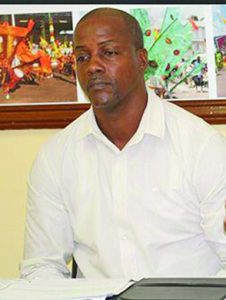… blames development officers for mismanagement
The Indigenous Peoples’ Affairs Ministry is unable to properly account for all of its assets and resources distributed across the regions, to the tune of hundreds of millions of dollars, as a result of lapses in the procurement, fiscal management and accountability laws and obligatory regulations – a situation that has reached alarming proportions.
Indigenous Peoples’ Affairs Ministry Permanent Secretary, Alfred King made the startling disclosure when he was joined by Indigenous People’s Affairs Minister Sidney Allicock and Minster within the Ministry, Valerie Gariddo-Lowe for the opening of a two-day meeting of the Ministry’s Community Development Officers (CDO).
He told the CDOs gathered at Moray House, they also contribute to the mismanagement in the system. Pointing out the situation recently unearthed at the Ministry, through its various mechanism and outlying offices and unit, the Permanent Secretary said it has been failing to accurately account for resources that have been distributed.
According to King, recent queries were undertaken by the Ministry that focuses on compliance with the Fiscal Management and Accountability Act and Guyana Procurement Laws among other standards.
In making the disclosure, King said it was “only two days I was spending over three and half hours trying to not ramble but go through thoroughly, what is the assessment of the Ministry’s performance by the FMA standard by the Stores Regulation standard, by the Procurement Act standards and what we found is quite alarming in some cases.”
According to the recently appointed Permanent Secretary, “there are queries as it relates to the Ministry not being able to account accurately and efficiently for the distribution of its assets and resources to support the community’s work.”
He lamented this to be a most distressing, since on further investigations it was discovered that there are several gaps existing in the system, in addition to other breakdowns in the governance mechanisms.
“What we found was that there were gaps as it relates to people who should be involved and persons who should be taking action to correct those deficiencies.”
King said the Ministry has since taken cognisance of the existing gaps in the Indigenous Affairs Ministry’s operations. He highlighted too, “lots of parallel operations… things are happening and people are operating in silos when in fact we should be operating at one Ministry.”

The Ministry’s Permanent Secretary used the occasion of the two-day meet to challenge the CDOs in the formulation of strategies on the way forwards, to bring to fore and address the sore issues plaguing the Ministry such as outstanding liabilities.
“I want to see you come up with a plan for us to reduce all those liabilities that we have out there.”
Debts
Bemoaning the point, the Permanent Secretary pointed to the Ministry’s solicitation of the services in various communities, such as with the Uniform Assistance Programme where persons are employed to construct the garments.
“After a year and two sometimes we still owe the people out there…We operate an annual budget, that is a financial year from January to December and therefore we should not be talking about operationalising the previous year’s budget for five and six months into a new year, something is fundamentally wrong with that and must be changed.”
Lamenting other woes being experienced by the Ministry and departments such as the CDO’s, King pointed to the Hinterland Employment Youth Service (HEYS) with some 1800 persons enlisted across the country –many of whom have since begun complaining.
He regaled the objectives of the project which could ultimately lead youth employment and self-empowerment King chided the CDOs saying “if you are out there and you not part of this whole process of trying to empower young people then you are not really with the Ministry.”
King was adamant the CDOs should take a more proactive role in engaging the HEYS and similar programmes targeting hinterland regions.
“You are supposed to be ensuring that you help to coordinate and manage the mobilisation for these young people for monthly payments of their stipends, we are still getting reports that we are taking too long to get out there, that’s difficult to conceptualise if we know that we have ongoing presence on the ground,” according to King.
He said “you can understand how frustrating it can be from time to time when we get these types of reports.” King was adamant during his interaction with the CDOs “If you don’t like what you do, best thing is to get out of it.”
Relationships
Speaking to the importance of the CDOs and their relationship to the Ministry, King at the onset announced that the meetings will no longer be held annually.
“You are regular staff and this should be statutory engagements where you are given policy directives,” in addition to performance reviews and evaluations.
King said the meetings will in future be held with a quarterly arrangement “where you work closely with all the units in the Ministry to execute their works.”
Community Development Officers attached to the Ministry are posted with the majority being located in Regions One (Barima-Waini), Seven (Cuyuni-Mazaruni), Eight (Potaro-Siparuni) and Nine (Upper Takatu-Upper Essequibo) while one officer is tasked with responsibility for the coastal Amerindian communities.
The meeting was organised by the Ministry’s Department of Community Development and Governance.











